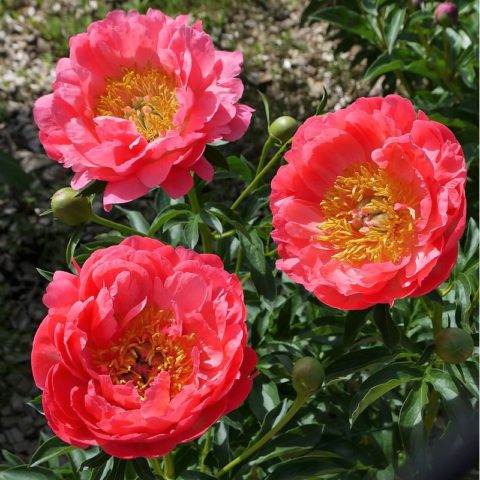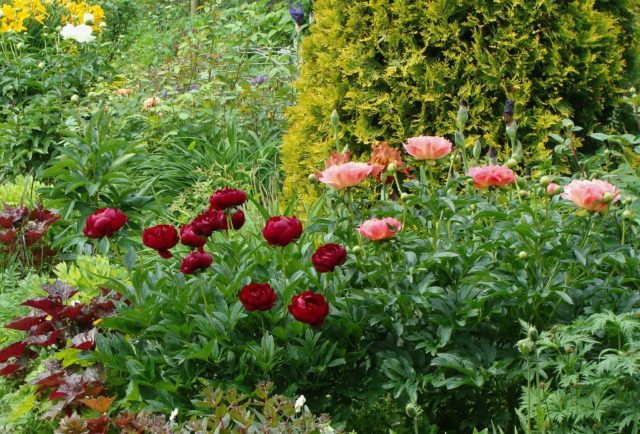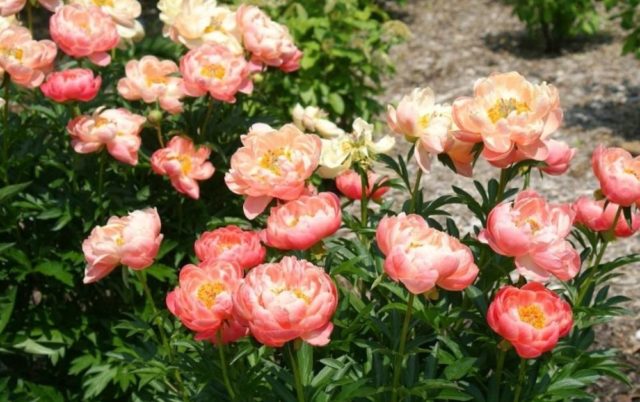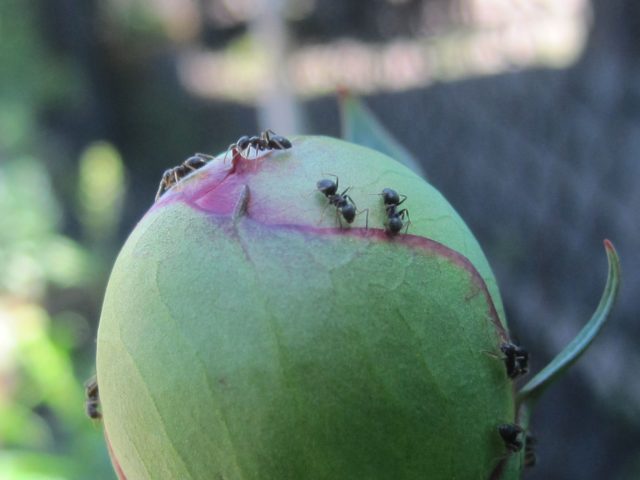Content
The Coral Sunset Peony is a delightful sight during the flowering period. The delicate color of the blossoming buds holds the observer's eye for a long time. It took more than 20 years to develop this hybrid. But experts and amateur flower growers are sure that the result is worth the time and effort spent.

It took over 20 years to develop Coral Sunset
Description of peony Coral Sunset
Coral Sunset is a semi-double peony variety with characteristics of treelike and herbaceous species. The bush forms erect shoots, densely covered with large openwork leaves. The growth of green mass occurs quickly, the decorative effect remains until the end of the season. The average height of the bush is 1 m. Powerful shoots do not allow the plant to disintegrate under the force of the wind or the weight of the buds, so there is no need to establish a support.
For the full development of a peony, you need a sunny area without drafts. Coral Sunset prefers fertile soil with a loose structure. Moisture near the roots should hold well, but not stagnate for a long time. Owners of the Coral Sunset peony do not need to worry about sheltering the bush for the winter, because it remains viable when the temperature drops to -40 ° C. Regions with severe winters belonging to the 3rd zone of frost resistance are suitable for cultivation.
Peony flowering features Coral Sunset
Abundant flowering of the variety is observed from the third year. To do this, Coral Sunset requires a lot of sun, good hydration and nutrition. The first buds, depending on the region, bloom in the final days of May or in the early days of June. Withering of the last flowers occurs in 4-6 weeks.
Flowers are semi-double, 15-20 cm in diameter. The life span of each of them is approximately 5 days. During this period, they gradually change color from bright coral or salmon to pale pink or cream. In partial shade, the original color remains longer.
Many petals, arranged in 5-7 rows, converge in the lighter middle with bright yellow stamens. At dusk, the flowers close to open again at dawn. The Coral Sunset herbaceous peony is ideal for cutting: with regular water changes, it does not fade for up to two weeks.
Differences between Coral Sunset and Coral Charm peonies
Thanks to the tireless work of breeders, many peony hybrids with coral buds have been born. Coral Sunset is practically the twin brother of Coral Charm. They belong to semi-double species, they begin to bloom at the same time and have a similar structure of the bushes. Both varieties of peonies are very popular among flower growers.
The difference in varieties in the structure and color of the buds. Firstly, Coral Charm has more petals. Secondly, the original color of the flowers of this variety is dark pink. As they bloom, the petals become light coral with a snow-white border, and before withering, they become yellow.
Application in design
Strong compact bushes with delicate coral flowers are widely used in landscape design. The ability to grow without support increases the variety of combination options. Successful examples of the introduction of Coral Sunset peonies into the landscape of a personal plot are:
- Lonely plantings near the house or in the center of a small lawn.
- Create a row along a walkway, fence, or zone dividing line.
- Central or middle level of a multi-tiered flower garden.
- Japanese-style rocky flower bed.
- Group planting with low conifers and leafy crops with a dense crown.
- Combination with dark red buds.
- Composition with small-flowered crops below or above 1 meter.

Peony "Coral Sunset" goes well with dark red flowers
The beauty of the Coral Sunset variety is emphasized by undersized conifers. When choosing plants with the same flowering period for the neighborhood, it is worth considering the combination of colors. In most cases, it is best not to use more than three shades in one composition. For crops that bloom in the spring or in the second half of summer, the peony bushes of the variety in question will be an excellent background.
Reproduction methods
The simplest and most common way of reproduction of Coral Sunset peonies is by dividing the root. Cutting and rooting of cuttings is rarely practiced due to the complexity and duration of the process. It is better to divide a bush 3-4 years old. Each part of the peony rhizome, prepared for planting, should be no shorter than 10 cm and have at least 2-3 buds.
The ideal time to divide the bush is the end of August and the first half of September. During this period, the active development of the peony stops, which contributes to rooting. In order to avoid contamination, "delenki" are treated with a disinfectant solution. Before frosts, the ground above the planted root should be mulched with dry leaves, needles, rotted sawdust or grass.
Planting a Peony Coral Sunset
Planting of the Coral Sunset lactic-flowered peony is carried out at the end of the season: from August to the end of October. The weather in the regions is different, so it should be calculated so that it has time to take root before the first frost. Spring planting in warm ground is allowed. But the young plant needs to be sheltered from the scorching sun, and there will be no flowering this year.
The site chosen for planting should be sunny and calm. The peony is harmed by prolonged shade from buildings, fences, trees or bushes. However, the absence of direct sunlight for several hours after lunch will help to maintain the bright color of the flowers. The soil needs light loamy. Low fertile soil is very easy to make usable by adding sand, turf and organic matter.
Peony planting stages:
- Well formation... The standard depth is 50 cm. If a drainage layer is needed for the outflow of water, it is increased by 10-20 cm. Gravel or broken brick can serve as drainage.
- Planting a peony... The root is placed so that the upper bud ultimately turns out to be 5 cm buried in the ground. It is covered with earth from the hole enriched with organic matter, sand and turf.
- Completion of the process... The covered earth is pressed so that there are no voids left near the root. Around the sides are formed with a height of 4-5 cm. Produce abundant watering.
Follow-up care
Coral Sunset requires little maintenance. The growing process is reduced to the following activities:
- Watering - the ground near the peony should not completely dry out.
- Loosening of the soil - the absence of an earth crust contributes to the retention of moisture.
- Weed Removal - Retains nutrients in the soil and prevents infestation.
- Top dressing - necessary for development and lush flowering.
- Spraying - protects the peony from diseases and pests.
The initial supply of nutrients in the soil is enough for a peony for 2 years. Further it is impossible to do without regular feeding. The first is carried out in early spring, using nitrogen fertilizers. The next two are carried out before and after flowering using mineral complexes. Preventive spraying with fungicides and insecticides is carried out twice a year.

For abundant flowering, peonies are fed in early spring and during budding.
Preparing for winter
With the onset of the first frost, the preparation of the Coral Sunset variety for wintering begins. First, all shoots are cut to ground level. The next step is to mulch the trunk circle with dry leaves, needles, sawdust, hay or compost.
Peonies need a full-fledged shelter only in the first and second year of life. It is made from spruce branches, film or covering material. In early spring, the cover and mulch layer must be removed so that the sprouts can freely break through.
Pests and diseases
If the leaves and flowers of the peony have become smaller or the bush looks sick, old age may be the cause. It is necessary to dig up and divide the roots, and then plant the "delenki" in a new place. The poor health of the bush can cause various diseases or pests. Coral Sunset is often found with root rot. Easily visible diseases: powdery mildew and cladosporia.
During budding, peonies are often bothered by ants. Insects can seriously damage flowers. Bronzovki, rootworm nematodes and aphids are often attacked. To preserve the decorativeness of the peony, they use folk methods of combating diseases and pests or resort to the help of special means.

Ants are dangerous pests of peonies
Conclusion
Peony Coral Sunset is an unusually beautiful plant. Breeders have spent many years creating it, but the result did not disappoint the flower growers. The unusual color of the buds, combined with strong stems, brought Coral Sunset into the group of the most popular peony varieties. To unleash the full potential of the Coral Sunset variety, you need a sunny place without winds, light fertile soil and standard care. Regular watering, loosening, weeding, top dressing and spraying are all you need to keep your crop healthy.
The Coral Sunset lactic-flowered peony is ideal for creating an enchanting atmosphere in the garden. In return for following the simple rules of care, the owners receive a huge number of large coral buds. Coral Sunset will not leave indifferent either the owner or passers-by.
Peony Coral Sunset reviews








